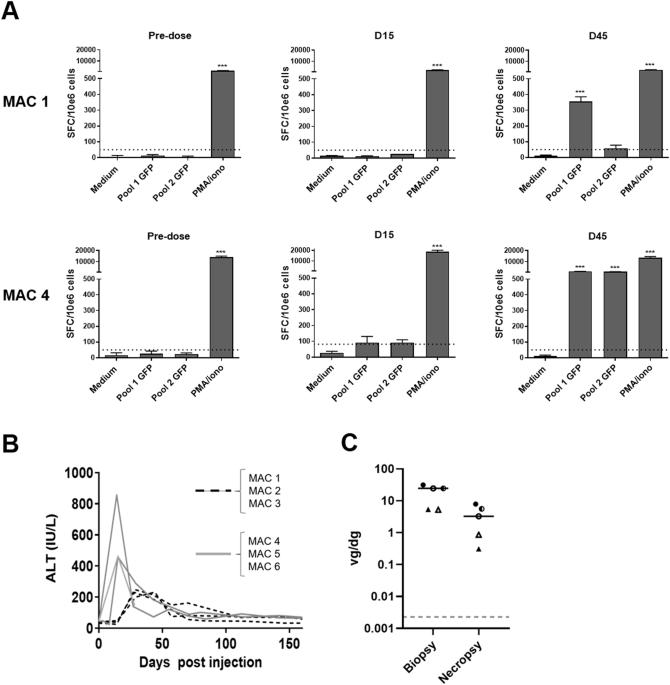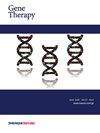在aav介导的基因转移后,病毒基因组的不完全消除与非人灵长类动物肝脏的慢性炎症有关。
IF 4.5
3区 医学
Q1 BIOCHEMISTRY & MOLECULAR BIOLOGY
引用次数: 0
摘要
肝脏是一个独特的器官,免疫可能偏向无效的反应,特别是在病毒感染的情况下。慢性病毒性肝炎依赖于t细胞免疫应答无法根除抗原。在用于治疗性基因转移的重组腺相关病毒的案例中,相互矛盾的报告描述了对不同转基因产品的耐受性诱导,而其他研究显示传统的细胞毒性CD8+ T细胞反应与转基因表达的快速丧失。我们对6只非人灵长类动物进行了1年的随访,所有动物都接受了携带GFP转基因的rAAV8载体,剂量为7×1012 vg/kg。我们报告说,尽管抗gfp外周细胞反应和肝脏转基因表达的丧失,我们仍然能够在肝脏中检测到持续的病毒基因组,直到注射后1年。这些病毒基因组与肝脏炎症、纤维化和CD8 T细胞衰竭的迹象相关,包括PD-1的高表达。我们的研究表明,aav8介导的基因转移可导致基因转移几个月后肝脏中转基因表达的丧失和慢性炎症。本文章由计算机程序翻译,如有差异,请以英文原文为准。

Incomplete elimination of viral genomes is associated with chronic inflammation in nonhuman primate livers after AAV-mediated gene transfer
The liver is a unique organ where immunity can be biased toward ineffective response notably in the context of viral infections. Chronic viral hepatitis depends on the inability of the T-cell immune response to eradicate antigen. In the case of recombinant Adeno-Associated-Virus, used for therapeutic gene transfer, conflicting reports describe tolerance induction to different transgene products while other studies have shown conventional cytotoxic CD8+ T cell responses with a rapid loss of transgene expression. We performed a 1 year follow up of 6 non-human primates after all animals received an rAAV8 vector carrying the GFP transgene at doses of 7×1012 vg/kg. We report that despite anti-GFP peripheral cellular response and loss of hepatic transgene expression, we were still able to detect persisting viral genomes in the liver until 1-year post-injection. These viral genomes were associated with liver inflammation, fibrosis and signs of CD8 T cell exhaustion, including high expression of PD-1. Our study shows that AAV8-mediated gene transfer can results to loss of transgene expression in liver and chronic inflammation several months after gene transfer.
求助全文
通过发布文献求助,成功后即可免费获取论文全文。
去求助
来源期刊

Gene Therapy
医学-生化与分子生物学
CiteScore
9.70
自引率
2.00%
发文量
67
审稿时长
4-8 weeks
期刊介绍:
Gene Therapy covers both the research and clinical applications of novel therapeutic techniques based on a genetic component. Over the last few decades, significant advances in technologies ranging from identifying novel genetic targets that cause disease through to clinical studies, which show therapeutic benefit, have elevated this multidisciplinary field to the forefront of modern medicine.
 求助内容:
求助内容: 应助结果提醒方式:
应助结果提醒方式:


